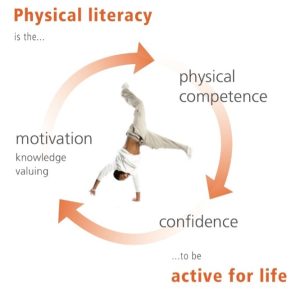Supporting Physical Literacy!
November 28, 2021 - 5 minutes readOur school is a physically literate community!

Interested in learning more about our Framework for Enhancing Student Learning (2019 – 2022)? IP FESL 2021-2022
In May 2022, our school team had the pleasure of sharing the success of our three year focus on physical literacy. You are invited to view highlights from our presentation HERE.
Why is Physical Literacy Important?
Did you know the data around physical activity is alarming? On average, kids are still sitting too much and moving too little to reach their full potential. Only 39% of 5- to 17- year-olds are reaching their recommended physical activity levels as outlined in the Canadian 24-Hour Movement Guidelines for Children and Youth. Just 62% of 3- to 4-year-olds are achieving the recommended activity levels for their age group.
For a full review of this report visit: https://www.participaction.com/en-ca/resources/report-card
10 Ways Raising a Physically Literate Child is like Raising a Reader
By Richard Monette, Active for Life
-
Make reading/physical literacy a family value
Kids are born to play. They are born to run, jump, and skip. They learn by emulating what they see around them. Play as a family. Go out and enjoy learning new skills, activities, and games.
-
Let them read what they enjoy/do the physical activities they enjoy
Pleasure is the greatest incentive. Kids will do what they enjoy. They will also enjoy what they are good at. This means that they might repeat a game over and over. Support and reward all games, sport, or activity your kids enjoy. And make sure you play with them.
-
Be sure they are reading/playing at an appropriate level
Remember one simple rule as you support your child in activities and sports: every kid must do the right things at the right times under the right conditions. You don’t expect your first-grader to read Shakespeare, so don’t push them into doing physical activities that they are not ready to do. More importantly, don’t enroll them in programs that might be beyond their age. Instead, keep play simple and age-appropriate.
-
Don’t use reading/physical activity as a punishment
I cringe when I see a coach or a PE teacher use physical activities as a punishment (“10 push ups for being last.”). Reverse the trend. Promote play, games, and activities as a reward. As something special to be cherished.
-
Give books/equipment as a gift
Gifts are special. They spark excitement and kids’ imaginations. Try to give your child toys that will encourage them to be active and promote the joy of playing.
-
Let your kids see you read/be active for fun
You have a powerful modeling effect on your child. If your child sees you enjoying being active, then they will see games, activities, and sport as a normal and worthwhile part of life.
-
Don’t over-correct, don’t over-practice
One way to make certain your kids will resent reading is by pushing them to read perfectly too early. The same applies to their love of being active. Mistakes are a critical part of developing as a reader or becoming a physically literate child. Support, encourage, and guide your child.
-
Point out words/physical activity everywhere
Humans are born to move. We are physical beings. From the prima ballerinas to top athletes, we love to see great displays of physical aptitude. But don’t forget the everyday display of skills. Encourage your child to recognize these skills everywhere. Point out everyday examples of physical ability: “Look at that firefighter climbing the ladder. What skills does she need to do that?”
-
Set aside time for kids to read/be active on their own
Free play is essential for kids. Be sure to encourage them to play by themselves without a tablet or computer.
-
Fun, fun, and more fun!
Not every child will become an avid reader or a world-class athlete. However, both literacy and physical literacy are fundamental to the development of your kids. Most youngsters are born with the capacity to read and move well, but like any other skill, it must be learned and repeated on a regular basis so that it becomes second nature. Fun and enjoyment are the secret ingredients to learning new skills.
Original article: https://activeforlife.com/raising-physically-literate-child-like-raising-reader/

Recent Comments